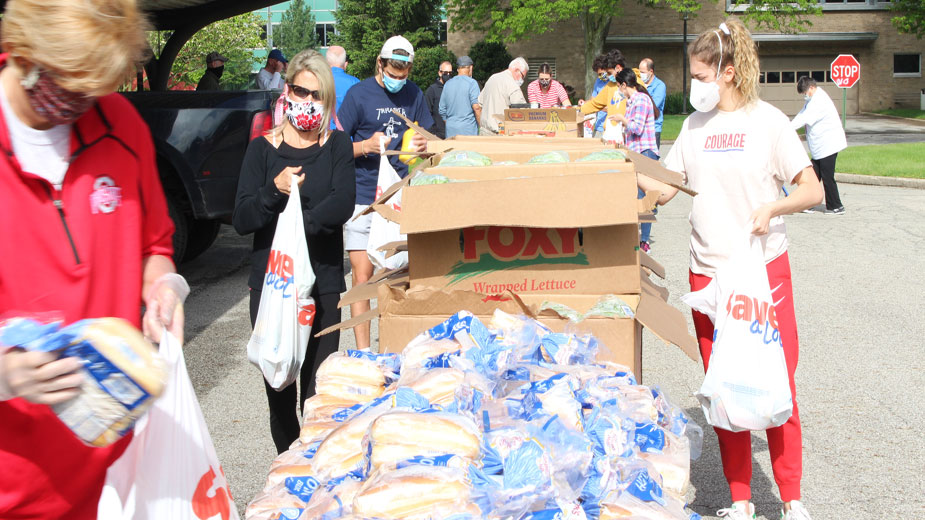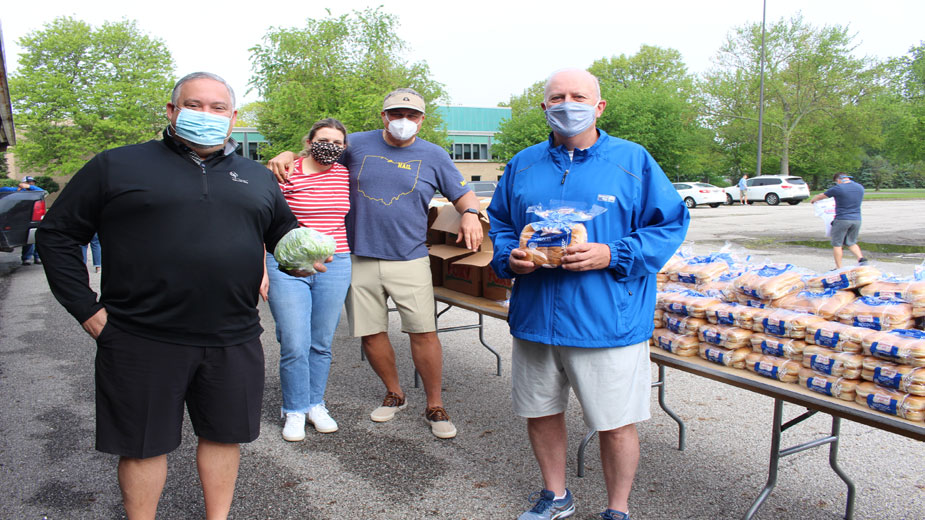YOUNGSTOWN, Ohio – Like all entities during the coronavirus outbreak, nonprofits are being challenged to change the way they do business while dealing with financial uncertainty.
Many leaders of these organizations, such as Teresa Boyce, co-director of Beatitude House Ministries in Youngstown, have all or most of their staffs working remotely.
“Our offices look a lot different. They’re a lot quieter,” she says.
Staff at Beatitude House, which serves disadvantaged women and children, learned to use Zoom, while rethinking the most routine of business tasks. But the biggest change, Boyce says, is “adapting to serve the needs of our clients.”
Those rapidly changing needs leave nonprofits trying to hit a moving target, all while watching some of the biggest drivers of funding disappear.
“Our biggest fundraising event was supposed to be May 1,” Boyce says, referring to the annual wine tasting and auction that each year generates as much as $60,000 for Beatitude House.
Students Motivated by the Arts, or Smarts, had to cancel two events that typically net the nonprofit $40,000, says Becky Keck, president.
At the last minute, The Hope Foundation of the Mahoning Valley had to cancel its annual Wine for Hope event. Executive Director Anthony Spano says the goal was $25,000 to $30,000. “We’re not going to be able to raise that money plus any additional expenses that we already paid,” he says.
The Hope Foundation serves children battling chronic or terminal illness. Spano says the group has reallocated money to help children and their families during the pandemic, but it’s having trouble identifying them since they don’t know who has recently fallen on hard times.
“We want to help people and we have some money right now to do that,” Spano says. “We’re hoping that these applications come flying in. We want to help them with treatment and help them get on their feet.”
Many area nonprofits have made responding to COVID-19 their top priority for at least the near future.
The Community Foundation of the Mahoning Valley, along with the Youngstown Foundation and the Raymond John Wean Foundation, created the COVID-19 Crisis Relief Application, which allows organizations to simultaneously submit the same proposal to all three organizations.
Community Foundation President Shari Harrell says the three foundations distributed $785,510 through the second week in May. “We knew that the needs, especially early, were going to be around emergency and crisis needs,” she says.
In particular, Harrell says, her group wanted to address housing stabilization and food insecurity.
The United Way of Youngstown and the Mahoning Valley came to the same conclusion. “We thought food would be an issue,” says United Way President Bob Hannon.
Hannon says staff quickly shifted out of “event mode” and got to work. United Way distributed more than $50,000 worth of food cards from Giant Eagle and Save-A-Lot grocery stores to families in the school districts the organization serves with its Success After Six program.
It also started to take food directly to the community.

For the past few Saturdays, United Way staff and volunteers have gathered in the parking lot of Southwoods Health in Boardman to organize and deliver food that Save-A-Lot donated. “It’s everything from young mothers to people in their 80s and 90s,” Hannon says of the recipients. “That’s where we’ve done most of the work.”
The first week they delivered food to 100 families.
Now they serve around 225.
The United Way launched its COVID-19 Response Fund March 16. Hannon says the fund has generated more than $200,000 in donations, much of it coming from people “seeing the work. Word-of-mouth.”
The Youngstown Area Jewish Federation also found itself undertaking a large food distribution operation.
The Jewish Federation oversees the Jewish Community Relations Council, Jewish Family Services, Heritage Manor Rehabilitation and Retirement Community, Levy Gardens Assisted Living Facility as well as the Jewish Community Center.
“We had a kosher meals on wheels program that was delivering 350 to 1,000 meals a month,” says its executive vice president, Andrew Lipkin.
Once the shutdown happened, lifeguards and fitness instructors employed at the Jewish Community Center were redeployed as delivery drivers for an expanded food delivery service. “We picked up meals from Direction Home of Eastern Ohio, and that’s 3,500 meals a week,” Lipkin says.
The center also received an emergency pandemic child care license, allowing it to operate as a day care for children of essential workers.
At Heritage Manor and Levy Gardens, staff began using Zoom and Skype to keep families connected, while many of the programs held at the Jewish Community Center – fitness, dance, support groups, early childhood classes – transitioned online. “A lot of them will continue because people can’t congregate at this point,” Lipkin says.
Social distancing is particularly challenging for the performing arts, says Keck, the Smarts president. “I think we’re more important than ever before,” she observes.
Typically, Smarts provides arts education for children, both on-site and in-school. Today, lessons are done online while students are at home.
Smarts held two creative writing classes live online and is piloting online classes in guitar and theater. “We’re trying to see, in each of the disciplines, how we’re able to do them,” Keck says.
The United Way of Trumbull County is piloting a program to recognize people who have made a difference during the pandemic. “When this started we wanted to thank people in the community who were going over and above,” says Christine Cope, the chapter’s director of marketing and development.
Through its Thankful Acts of Kindness initiative, Trumbull United Way has been honoring standout individuals and organizations with surprise prizes from local businesses. “We’re giving them business while we’re thanking these people on the front lines,” Cope says.
Early in the outbreak, the Trumbull County Health Department asked United Way to help it to acquire masks for front-line workers.
United Way of Trumbull County President Ginny Pasha says it has already donated more than 1,000 hand-sewn masks, and has requests for another 300.
It is also busy preparing for a potential second wave of need, expected to arrive in the next couple of months. “Partner agencies are expressing concern about the financial stability of families,” Pasha says.
While foreclosures, as well as rent and utility payments, have been delayed, Pasha notes, they haven’t been forgiven. She says United Way’s partner agencies are worried that many families won’t be back on their feet by the time their bills resume. “Their concern is that in June, July and August, there will be an onslaught of people needing assistance,” she says.
At the Community Foundation, Harrell says at first it was reacting to the moment and just trying to make sure immediate needs were met. “Now that things are slowing down, we are looking at things a little differently.”
And that means the foundation is “trying to plan for the totally unknown,” she says.
The same is true at other nonprofits.
Back at the Hope Foundation, Spano is preparing for the unknown by re-evaluating upcoming expenses. “We’re looking at a lot of things that we were planning on doing over the next year and reallocating them to not use that money because we don’t know what we’ve lost yet,” he says.
Hannon’s plan for the unknown is to quickly adapt. He envisions a future where United Way organizes prescription pickups and transportation to doctor visits for senior citizens.
“I think our work will change,” he says. “We’re not going to be the same United Way before COVID-19 as after COVID-19.”
But how all of this will affect funding remains the biggest unknown.
“Donations are down somewhat. But I think you’re going to see it more in six months,” says Boyce from Beatitude House.
“While these foundations have been able to step up right now and give us some relief, that came out of their pool of grant money. Now when they go to do their program support, that may be a little less,” she says.
The larger question is which will diminish more quickly: the funding or the need?
“We don’t know how long the funding will be there. We don’t know how long the coronavirus will be there,” says the Jewish Center’s Lipkin.
Nor does Lipkin know how long it’s going to take for people to get back to the same level of employment as before the virus.
What he does know is that mitigating the damage the coronavirus has done is a task that will not be completed easily or quickly. “It’s going to affect people for many years to come.”
Pictured at top: Handing out food through the United Way of Youngstown and the Mahoning Valley are Chris Sammartino, Donielle and Ed Muransky, and Bob Hannon.
